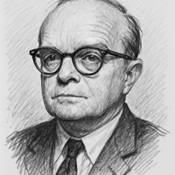
Artistic sketch of Truman Capote. For editorial use only.
Truman Capote
Playwright
Biography
Truman Capote
Truman Capote (1924–1984) was a celebrated American writer whose distinctive voice and literary innovation spanned fiction, nonfiction, and stage. Though best known for his novels and journalism, Capote also made notable contributions to the world of theatre, particularly as a playwright. His signature style—marked by lyrical prose, psychological insight, and vivid characterization—translated powerfully to the stage, where he explored themes of identity, isolation, and human complexity.
Born Truman Streckfus Persons on September 30, 1924, in New Orleans, Louisiana, Capote demonstrated literary talent from an early age. He gained early fame with his 1948 debut novel Other Voices, Other Rooms, and solidified his reputation with the novella Breakfast at Tiffany’s (1958), which was later adapted into an iconic film. His foray into playwriting emerged in the 1950s and 60s as he expanded his creative reach beyond prose.
Capote’s most recognized theatrical work is House of Flowers (1954), a musical he co-wrote with composer Harold Arlen. Based on his short story of the same name, the show premiered on Broadway with a cast that included Pearl Bailey and Diahann Carroll, and featured a blend of Haitian folklore, romance, and lush musical storytelling. Though its initial run was modest, House of Flowers was praised for its poetic sensibility and remains a unique entry in the canon of mid-century American musical theatre.
Capote also adapted some of his stories for the stage and television, including A Christmas Memory and The Grass Harp, both of which were turned into stage plays and musicals. His deep understanding of character and mood translated well into dramatic settings, where his emotionally rich narratives resonated with audiences.
Though his playwriting output was limited compared to his prose, Capote’s influence on 20th-century American culture is profound. His groundbreaking nonfiction novel In Cold Blood (1966) reshaped the boundaries between journalism and literature, and his personality made him a fixture of the literary and celebrity worlds.
Truman Capote died on August 25, 1984, in Los Angeles. His work endures through stage and screen adaptations, and his forays into theatre remain a testament to his versatility and creative daring as one of America’s most distinctive literary voices.
Shows
Shows associated with Truman Capote
Additional Information
N/A